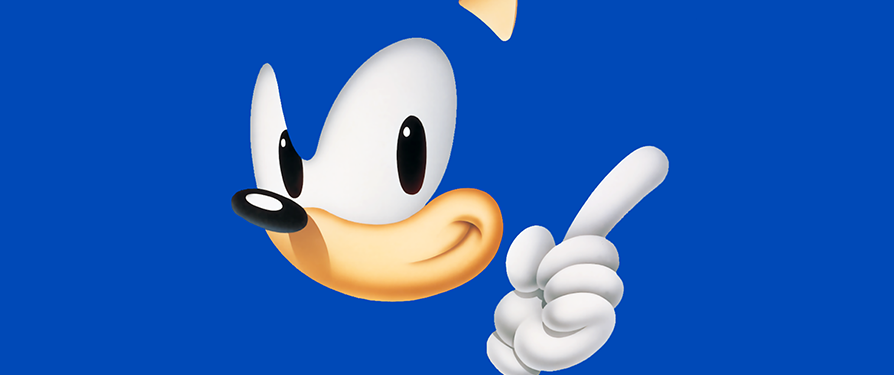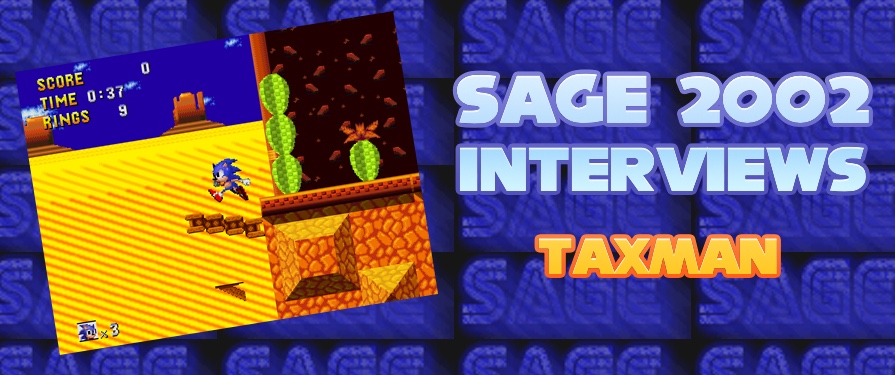If you’re not involved in the Sonic fangaming/hacking community, or even the fan community at large, you might have heard of or seen either Sonic XG or Retro-Sonic at one point or another while perusing forums and websites. Both titles are not only fantastic re-creations of classic 2D-Sonic, but they are influential to others wishing to do the same. At the 2007 Sonic Amateur Games Expo, both of these titles were among the best of the lot, but were each lacking in a department that the other excelled in. XG had extraordinary graphics and design. Retro-Sonic prided itself on its far-superior engine.
Soon after, these projects combined to form a fangaming juggernaut. The perfect Sonic engine and the definitive fan-sequel to Sonic 3 & Knuckles merged to become “Retro-Sonic XG.” However, the buzz was short lived. The RSXG team, Christian Whitehead (Taxman), Euan Gallacher (Sir Euan), and Joseph Waters (Nitemare) are rarely heard from and thus, XG gradually vanished… until today.
The creator of the Retro-Sonic engine, Whitehead, re-surfaced when it was announced that my Sonic project, Sonic Nexus, would also be using the engine, thus creating the “Retro-Sonic Series.” The 2008 demo of Nexus motivated Whitehead to construct a brand new version of Retro-Sonic, one that would optimize the development of both games. After the successful launch of Nexus’ demo, Christian retuned to Retro-Sonic XG. Now that months of work has been put into the title, he’s ready to unveil new information and screenshots with the world. Click the image thumbnails to make them full-size.
BF: Welcome to the TSS Interview of Christian Whitehead, Christian Whitehead.
Christian Whitehead: Thanks?
BF: OK, let’s begin with the question that is on every RSXG fan’s mind. The project has been out of the community’s conscience for the past year or two. Nobody knows if it’s dead or alive. When you joined the Nexus team, that raised further suspicions that you had left the project. Could you assure the readers and the community at large that RSXG is alive and well?
CW: Yes, I can. As most people know, a fair portion of development time in 2008 was spent creating the new revised edition of the Retro-Sonic engine, along with the RSDK and the 2008 Nexus demo. Before then, I had already converted a fair portion of the assets from Sonic XG into the 2007 version of Retro Sonic. While most people will groan at yet another engine change, this is the definitive change, and has already increased the productivity on the RSXG project. 2009 will be the year of Retro-Sonic XG though, as part 1 is slated for release, much in a similar vein to how Sonic 3 was released before Sonic & Knuckles.
BF: Part 1, eh? So, we’ll see 6 of the 12 zones in Sonic XG this year?
CW: Yes. Rather than putting out another 1 level demo of Final Fall, I wanted to finish a ‘complete’ work of sorts… and half a game is a more realistic target to keep us motivated.
BF: That’s an idea worth stealing, if you’re a fangamer.
CW: Haha, yeah. Even as half a game, there will be a lot of content. The aim is the same scope as Sonic 3, in terms of level sizes, bosses and the like. Which I guess makes sense, since RSXG is a sort of spiritual sequel that picks up where Sonic 3 & Knuckles ended.
BF: Yes, RSXG does what a lot of “Sonic 4″ fangames wish that they could do, in my opinion.
CW: And there are a LOT of those.
BF: Tell me about it. Now, after Nexus’ release, you talked about the new Retro-Sonic Development Kit (RSDK). How does the new RSDK benefit the development of XG?
CW: One of the big benefits, I reckon, has been the improved stage editing tools within RSDK. It’s now much quicker to setup tile mappings and stuff, so the process of building all the level set pieces is much less tedious. The updated scripting system, ‘TaxReceipt,’ is also more powerful than before, which makes for some cool cutscenes, graphical effects, etc etc. We’re aiming for a level of graphical quality on par with the 32bit Sega Saturn.
BF: Excellent! We talk about the RSDK, because we’re plenty familiar with it and how it works. However, readers might not understand what we’re talking about. What exactly is the Retro-Sonic Development Kit?
CW: Basically, the RSDK is a suite of tools that I created to design content for the Retro-Sonic engine. There are visual editors for Stages, Parallax, Tiles, Objects, etc. In addition there’s text based scripting with syntax hilighting and other additional setup menus for stuff like stage ordering and resource management. Since everything is scriptable, it’s actually possible to make games other than Sonic, too.
BF: I’m totally making a Socket fangame after Nexus then.
CW: Socket?
BF: Shitty Sonic clone with kickass music.
CW: Haha! Man, there’s a new Sonic clone discovered every minute isn’t there?
BF: Yeah, I should start ripping backgrounds from it and editing them to match my foreground tiles. Nobody will notice!
CW: They will now. You just said so.
BF: Well, damn. Let’s move on from my flub and talk “Part 1.” What are we going to see? Levels, characters, features? Give us the low down!
CW: Well, without giving too much away, you’ve got the standard triple threat of Sonic, Tails, and Knuckles as playable characters. There will be 6 zones: Final Fall, Peak Panic, Wood Works, Palm Paradiso, Scorched Spire and Robotic Resort, two of which some some keen players might recognize from their previous incarnations as Retro-Sonic levels. Also, the 7 chaos emeralds make an appearance, which means Special and Bonus Stages. Finally, plenty of bosses will be ready to attack and a data select menu will save your progress.
BF: When part 2 is released far down the road, will players be able to merge their Part 1 data with Part 2’s data to make a SUPER game?
CW: Definitely, although to make it simpler, we’ll just provide the full game to download and players can just use their existing save file to continue where they left off.
BF: So, players will have to manually copy their data into the new EXE? Sounds simple enough. Do you think people will manage to fuck that up? Haha…
CW: Anything’s possible, haha. I guess we can make an installer… but most people dislike that.
BF: Usually. Everybody at SFGHQ hates that shit.
I’ve heard rumors that all the level art is completed. Is it true that you’ll have to do no more graphical work for levels? I ask, because the level graphics always seem to be the hardest part for fangamers and hearing that all the level graphics are done will be a great sign of RSXG’s progress.
CW: Yes and no. We have graphics for all the zones, but I guess things always get tweaked or updated as you go, due to new ideas that might come up or tile considerations due to the change from MMF2 to Retro-Sonic. But overall, yes, level graphics aren’t too much of a worry now. In fact, it was one of the great benefits of the merge to me.
BF: It was a good choice. Retro-Sonic got what XG lacked and vice-versa. Who initiated the merger and were the level graphics a main reason that you decided to go along with it?
CW: Well, I was the one who extended the offer to Euan and Joseph. I was really impressed with the graphics, presentation and the overall feel of the game. They were paying attention to little details that I, up until that point, hadn’t had a chance to do in Retro-Sonic. I thought, “I should really be doing that!” Then, I considered that I’d only created graphics for about 3 of the Retro-Sonic levels and how much more work it’d take on top of all the other stuff I was doing. The merge just seemed like a good idea to me at the time, and when we had discussions about it, everything just seemed to click.
BF: What was the thought process behind joining up with the guys and I on Sonic Nexus? Months before the release, I was as surprised as people were on release day on the news that Nexus and Retro-Sonic were joining forces. You and Damizean were talking without my knowledge, as I never even considered asking you due to the XG merger.
CW: Haha, the fact you guys were considering using the Torque game builder? XD
BF: Oh…right. Well, it looked like a good idea at the time.
CW: No, seriously… Torque? XD
BF: It’s in the past. What’s it like working for two projects anyway? Besides that fact that it is time consuming and probably sucks at times.
CW: Well, for one, I guess, it has been one of the main driving forces that made me do a final restructuring of the Retro-Sonic engine! At least that’s over and done with, but it keeps things fresh for me too, I suppose. If I get a creative block or am bored with one, I can switch to the other. 
BF: Fair enough. So, back to RSXG. I remember seeing pictures of old builds that had appearances from classic Sonic antagonists, like Nack/Fang and Metal Sonic. Are they still hanging around and/or other villians coming to the party?
CW: Well, everyone’s favorite Egg Garden boss will make a comeback… does that count? Seriously though, in terms of actual “intelligent characters” no, but there may be a few cameo appearances from a classic boss or two. 
BF: Coo’. Well, I’m out of questions. Do you think that I missed anything?
CW: Yeah, we’ve covered all that there is to know.
Visit the Retro-Sonic Homepage
Visit the old Sonic XG Homepage
The Sonic Stadium may link to retailers and earn a small commission on purchases made from users who click those links. These links will only appear in articles related to the product, in an unobtrusive manner, and do not influence our editorial decisions in any way.



